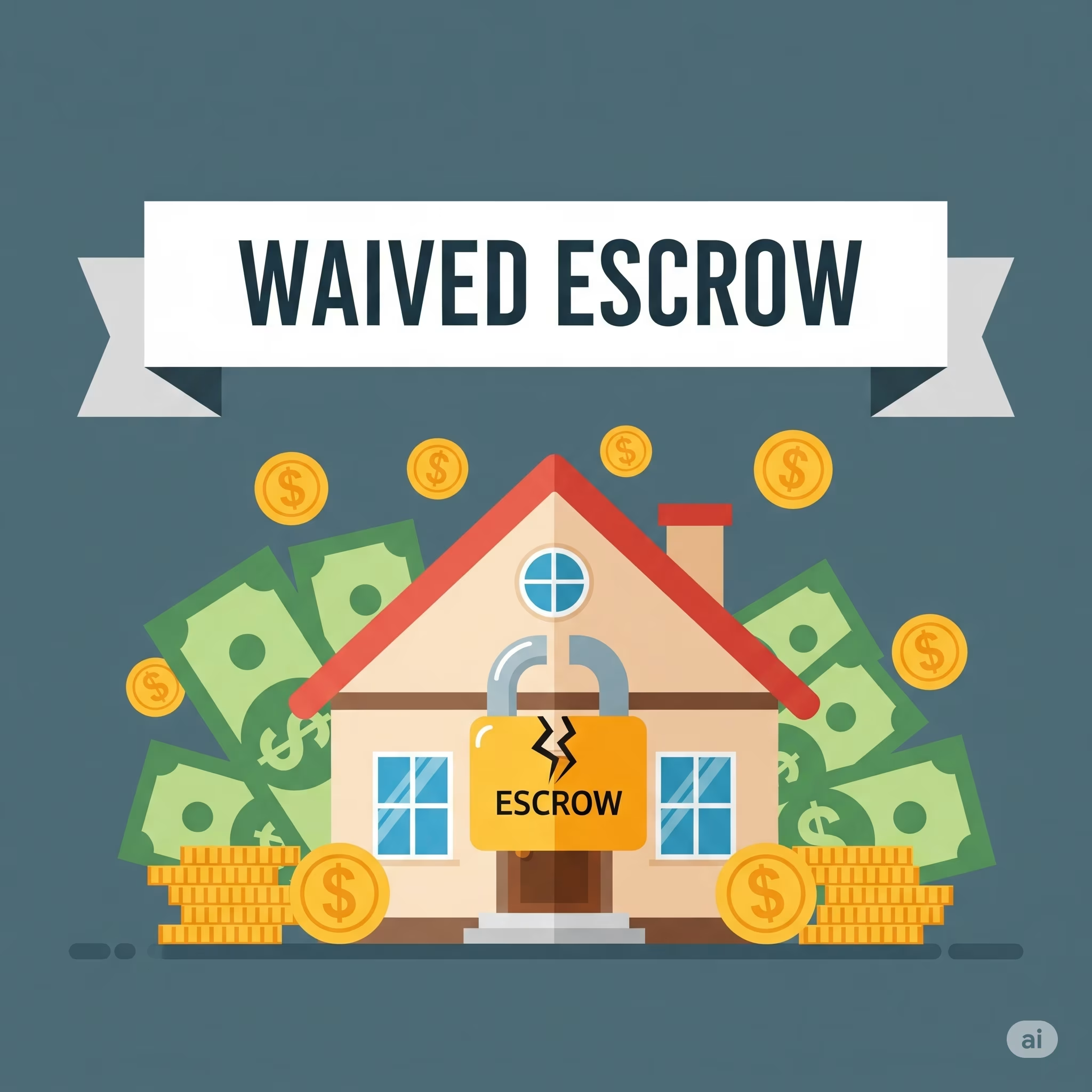When buying a home, most people focus on getting the right mortgage rate, but there’s another important decision you might not have thought about: whether or not to use an escrow account.
In recent years, more homebuyers are choosing to waive escrow — and it’s not hard to see why. Waiving escrow gives you more freedom and control over your monthly expenses and can reduce your “cash to close” by ~$10,000 by eliminating escrows at closing.
At Altgage, we’ve helped many homebuyers take this smart step, and we’re here to break it down in simple terms so you can understand the real benefits.
What Does Waiving Escrow Mean?
Normally, when you get a mortgage, the lender collects money from you every month to pay your property taxes, homeowners' insurance, and HOA. This extra money is deposited into an escrow account.
Waiving escrow allows you to assume full responsibility for paying your taxes and insurance directly, rather than having the lender collect them from you each month. This option reduces your monthly expenses and lets you save on your own terms. It may also aligns the annual or semi-annual expense of taxes with an end-of-year bonus
Want to know how title and escrow work together?

How Does It Work?
When you buy a home, your lender usually sets up an escrow account to collect and manage important payments, including:
✅ Property Taxes
These are annual taxes paid to your local government. With escrow, you don’t have to worry about saving up — the lender collects small amounts monthly and pays the taxes for you on time.
✅ Homeowners Insurance
This protects your home from risks like fire, theft, or natural disasters. The lender collects a monthly portion to make sure your insurance is always active and paid on time.
✅ HOA Fees (if applicable)
If your home is in a community with an HOA, fees are required for shared amenities. Some lenders also escrow HOA fees, making your payments simpler and less stressful.
With an escrow account, your lender collects these payments monthly along with your mortgage payment and pays them on your behalf when they are due.
Benefits of Waiving Escrow for Your Mortgage
When you waive escrow, you unlock these key financial advantages that can make homeownership more flexible and affordable:
✅ Improved Cash Flow: Your monthly mortgage payments can be $500 to $1,500 lower since you’re not prepaying taxes and insurance.
✅ Lower Cash to Close: You avoid the hefty upfront escrow payment, saving anywhere from $2,000 to $10,000 at closing.
✅ Opportunity to Earn Interest: You keep your money in your own account, which means you can earn interest in a high-yield savings account, like Wealthfront, instead of letting it sit idle with your lender.
Now, let’s break down each of these benefits in detail:
More Financial Freedom
The main reason people waive escrow is simple - you get full control of your money. You don’t have to give extra money to your lender every month. Instead, you keep it in your bank account until the bills are due.
This means your monthly mortgage payment only includes your loan principal and interest, with no additional amounts for taxes or insurance. Many homeowners prefer to have more money available each month, rather than locking it away in an escrow account where it earns no interest.
Waiving escrow also allows you to use your money as you see fit throughout the year. You can invest it, let it earn interest, or use it for personal goals - all while staying on top of your bills.
Lower Closing Costs — Keep More Cash in Your Pocket
One of the biggest surprises for many homebuyers is the amount of money they must bring to closing when escrow is required. Lenders will require 3 to 12 months’ worth of property taxes and homeowners' insurance to be paid upfront. That’s thousands of dollars you have to pay before you even move into your house. The amount of escrows collected depends on when you close in the year. Closing earlier in the year requires fewer months of escrows because you’ll have more time to make monthly payments before the annual tax bill is due. If you’re closing in August, your first payment will likely be in October, and you’ll only make three payments (October, November, December) before the property taxes are due. So, lenders will usually collect 9 months of escrows at closing, plus a 1-2 month buffer, making your escrow bill nearly 10-11 months' worth at closing.
With a waived escrow, that cash stays with you. We’ve helped clients at Altgage save anywhere from $2,000 to $10,000 at closing just by skipping the escrow setup. This can be a huge help, especially if you have other expenses, such as moving costs, renovations, or savings goals.
Improved Monthly Cash Flow with Lower Monthly Mortgage Payments
Waiving escrow doesn’t just help at closing — it can also improve your monthly budget. When your lender doesn’t collect for taxes and insurance, your monthly payment becomes much smaller. However, you will have to budget for a large annual expense. If you don’t feel confident in your ability to remember to save for taxes, then escrow is the right option for your peace of mind.
Some of our homeowners have seen their monthly payments drop by $400 to $800 simply by waiving escrow. Many people get an annual bonus and use that to budget for taxes. So homeowners appreciate this flexibility because they can plan their spending more freely, save for important goals, or simply enjoy lower housing costs on a month-to-month basis.

Earn Interest and Credit Card Points
- Savings Account for Property Taxes
- Credit Card Points or Early Discounts (for insurance payments)
Another reason homebuyers choose to waive escrow is the freedom it gives them when paying taxes and insurance. You can pay at the end of the year, twice a year, or in any way your local county allows. Some areas even offer discounts if you pay early. You can also earn credit card points while paying your insurance bill, and in some cases, qualify for extra protections
At Altgage, we’ve seen many clients take advantage of early payment discounts or utilize alternative payment methods, such as credit cards, to earn rewards. Waiving escrow simply gives you more options to manage your bills in a way that works best for your finances.
Important Note: You still owe the money, but instead of paying through monthly installments, you’ll make lump-sum payments at the end of the year for property taxes and insurance. This requires discipline to save throughout the year, but it offers the advantage of lower monthly expenses and greater financial flexibility.
Understand Your Taxes and Review Insurance Annually
When your lender handles escrow, you usually don’t see your tax or insurance bills until they’ve already been paid. That can sometimes lead to surprises, such as sudden increases in your monthly payment if taxes rise.
But when you waive escrow, you receive all your tax bills and insurance notices directly. You stay informed, catch any errors, protest your property taxes and shop for insurance annually. Want to shop for insurance? Upload your current policy here. It’s a simple way to stay in control and avoid unexpected costs.
Is Waiving Escrow the Right Move for You?
While waiving escrow offers many benefits, it’s essential to understand that it’s not suitable for everyone. It works best for homebuyers who are organized and comfortable paying larger bills once or twice a year. You need to be confident in budgeting for property taxes and insurance without falling behind on payments.
Most lenders allow you to waive escrow if you meet certain conditions, like a minimum down payment or good credit history. The good news? At Altgage, we offer escrow waivers with flexible down payment options, starting as low as 5% on conventional and VA loans. You don’t have to wait until you have a huge down payment saved up. Escrow cannot be waived on an FHA loan
Why More Buyers Are Choosing to Waive Escrow with Altgage
At Altgage, we make the mortgage process smoother by offering options that help you take control of your money. Waiving escrow is one of those options that can:
- Lower your upfront costs at closing
- Reduce your monthly payments
- Give you full flexibility to manage your bills your way
- Let you keep your cash in your account, collecting interest, or being used for your needs
Our clients love the freedom and financial flexibility that comes with waiving escrow, and our team makes sure you understand exactly how to take advantage of it.
Important Considerations Before Waiving Escrow
- Not all programs qualify for Escrow Waivers: FHA loans do not allow escrow waivers
- Not all lenders allow it: Some lenders have strict rules about escrow waivers. Many require a minimum down payment (often 20% or more) and a good credit score to qualify. At Altgage, we allow escrow waivers with 5% or more on conventional loans
- You must be financially disciplined: When you waive escrow, it’s your responsibility to pay property taxes and homeowners' insurance on time. Missing payments could lead to penalties, liens on your property, or even insurance cancellation.
- No safety net for increases: With escrow, lenders automatically adjust your payment if taxes or insurance rates increase. Without it, you must track these increases yourself and save enough money to cover them.
- Extra responsibility: Waiving escrow gives you more control, but it also means taking on more responsibility. You’ll need to stay organized and set aside money throughout the year.
Final Thoughts
If you prefer to keep more money in your account, have lower monthly payments, and manage your own taxes and insurance on your schedule, waiving escrow could be a smart decision for you.
At Altgage, we’re happy to guide you through your options, show you how much you can save, and help you decide what’s right for your unique situation.
Want to see how waiving escrow could benefit you? Apply with Altgage, and take control of your homeownership journey!
.avif)





